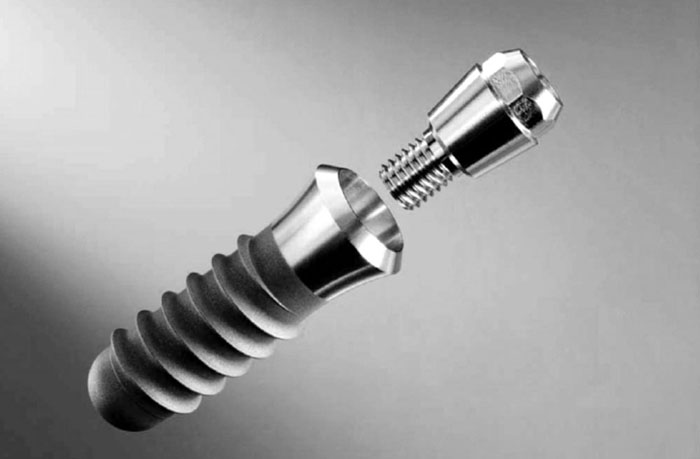Before Speaking about dental implants we should try to learn and understend the materials that they are made of .
Today over 95% of the implants are made of titanium
So lets at first talk about titanium as an metal and about Ti alloys used in production of dental implans.
So what is Titanium?
Titanium is a chemical element with symbol Ti and atomic number 22. This is Metal with a silver color low density and high strength. It is highly resistant to corrosion,and have a incredible biocompatibility.
Titanium was discovered by William Gregor in 1791. It was named by Martin Heinrich Klaproth .The name Titanium stands for the Titans of Greek mythology because of it strenght. Its most common compound, titanium dioxide is a photocatalyst and is used in the manufacture of white pigments.Other compounds include titanium tetrachloride a component of smoke screens and catalysts; and titanium trichloride which is used as a catalyst in the production of polypropylene.
Titanium can be alloyed with iron, aluminium, vanadium, and molybdenum, among other elements, to produce strong, lightweight alloys for jet engines, missiles, and spacecraft, military, industrial process ,automotive, agri-food, medical prostheses, orthopedic implants, DENTAL IMPLANTS and endodontic instruments and files, sporting goods, jewelry, mobile phones, and other applications.
The two most useful properties of the metal WHICH ARE VERY IMPORTANT and making the titanium perfect material used for dental implanst are corrosion resistance and the highest strength-to-density ratio of any metallic element.
According to the American Society for Testing and Materials (ASTM), there are six distinct types of titanium available as implant biomaterials. Amongst these six materials, there are four grades of commercially pure titanium (CpTi) and two titanium (Ti) alloys. The mechanical and physical properties of CpTi are different and are related chiefly to the oxygen residuals in the metal GRADE I-IV (ASTM F 67 )
The two alloys are Ti-6Al-4V and Ti-6Al-4V-ELI (extra low interstitial alloys)(ASTM F 136 )
VANADIUM AND ALUMINIUM ARE ADED TO TITANIUM TO IMPROVE ITS STRENGHT AND MAKING THE ELASTICITY OF THE IMPLANT VERY CLOSE TO THE ELASTICITY OF THE JAWBONE.
patrimoine plus platform Access educational materials focused on heritage awareness.
Commercially pure titanium (Ti CP) and extra low interstitial Ti-6Al-4V (ELI) are most common titanium base implant biomaterials. These materials are classified as biologically inert biomaterials. As such, they remain essentially unchanged when implanted
into human bodies. The human body is able to recognize these materials as foreign and tries
to isolate them by encasing it in fibrous tissues. However, they do not promote any adverse
reactions and are tolerated well by the human tissues
These metals do not induce allergic reactions such as has been observed with some stainless
steels, which have induced nickel hypersensitivity in surrounding tissues.
Biocompatible titanium base alloy suitable for bone implant should meet at least
the following requirements :
-Potentially toxic elements, such as vanadium, cooper and tin, should beavoided
-Elements that may have potential toxicological problems, such as chromium, nickel and aluminium, should be used only in minimum, acceptable amounts
The alloy should have high corrosion resistance
The alloy should have, at least, the following desirable mechanical properties: low modulus, high strength and good smooth and notched fatigue strength
The alloy should have good workability and ductility.


Leave A Comment